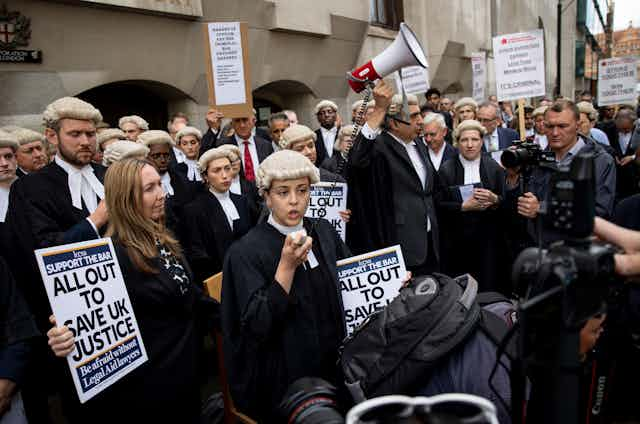For hundreds of years, barristers in England and Wales have ensured that parties in court are entitled to a fair trial with their own advocate presenting their point of view. This was an important step in establishing a fairer justice system, bringing protections promised by Magna Carta to the general population.
Given this history, some now find it surprising to see barristers, dressed in wigs and gowns, picketing courthouses in support of higher pay. But the impression that they are all well-paid members of an elite profession is misleading.
After the second world war, a generous system of government-funded legal aid supported a large and relatively prosperous criminal bar. Young barristers often earned a reasonable income in crime before specialising in other areas of work. This changed with the constriction of the welfare state from the 1990s, including into the Blair years. Resources made available for criminal work fell consistently and pay rates stagnated.
Barristers, who operate as self-employed and independent practitioners, were increasingly in competition with solicitors, who were allowed to practice advocacy in senior criminal courts from the 1990s.
Barristers have a unique mode of practice and deliver a very high standard of advocacy. Because of their historic commitment to supporting individual rights, their ethics are quite different to those of solicitors, whose origins and history are more concerned with property and business matters.
Solicitors mainly practise in firms, as partners sharing profits or as employees. This has largely insulated them from financial risk and shifting patterns in the availability of work.
Meanwhile, barristers have experienced continued financial precariousness, partly due to rates of pay and how they are paid. This is the basis for the walkouts, which began when many criminal barristers struck for two days in the week of June 27 2022. They are due to continue for an extra day each week until reaching a five-day strike in the week of July 18.
The core of the payment system is a fee for the brief (instructions for the case) which relates to the seriousness of the offence a client is charged with. Barristers then receive a daily rate for trial. While they might do similar amounts of preparation, the work is worth disproportionately less if the client pleads guilty, because the case ends quickly and they may never earn the trial rate.
The Secret Barrister, a barrister and blogger who writes anonymously about the justice system, claims that the basic fee for a two-day burglary trial in the Crown Court is £653. But the amount of work involved means this can easily work out to about £12.09 hourly.
Other grievances include barristers not being paid for work done for trials they cannot attend because their other cases clash. Payment is also only made once the case is finished. With a backlog of cases exacerbated by the pandemic, there are long delays. This can make the economics of practice difficult, especially for those starting out in their careers.
How much are barristers paid?
In defence of strike action, Jo Sidhu QC, chair of the Criminal Bar Association, claimed barristers had suffered an average decrease in real earnings of 28% since 2006 – and that those in the first three years of practice earn less than the minimum wage, a median income of only £12,200.
In 2021, an independent review of criminal legal aid chaired by Sir Christopher Bellamy QC examined median incomes of barristers.
The government claims this report found the median income of criminal barristers in 2019-20 was £79,800, and that 80% earned at least £45,000 after expenses. It admits junior barristers earn much less in their first couple of years of practice, but claims that this rises to £65,000 before expenses by their third year of practice.
The report confirmed, however, that significant numbers of barristers doing criminal legal aid were paid around £12,000 in the early years of practice. Even in the higher income brackets identified in the report, criminal barristers’ incomes were significantly below those in commercial or tax work, or solicitors working in elite firms.
Bellamy also found there was a high rate of attrition at the criminal bar, with the loss of ethnic minorities and women in particular, and an increasingly “aged” profile. While he was hesitant to blame pay alone, Bellamy recommended a general increase in the fees paid for criminal work by £35 million (15%) for both barristers and solicitor advocates.

In response to the strike action, the justice secretary Dominic Raab encouraged criminal barristers to accept a proposed 15% pay rise, or around £7,000 for a “typical barrister”. But this would not apply to the current huge backlog of cases created by the pandemic, many of which may take years to resolve. Nor would it necessarily address the loss of barristers not in the middle of the pay range.
Broader issues to address
Because so many junior criminal barristers have left the profession, strike action is about protecting the justice system as much as it is about pay.
Independent advocacy is a key ingredient of a political system supporting the rule of law. It allows citizens to access independent experts in court work without too much difficulty.
The general composition of the bar is a matter of public interest. When barristers from less-privileged economic backgrounds – and women and ethnic minorities – are forced to leave the profession over low pay, this preserves the bar as something only for the privileged. If lawyer advocates really are to represent citizens’ points of view, there must be a representative bar from which to choose.
If the current loss of junior barristers continues, the recruitment of judges who have practised criminal law and represent a broad demographic will be more difficult. The senior judiciary may continue to be skewed in favour of white males with privileged backgrounds.

